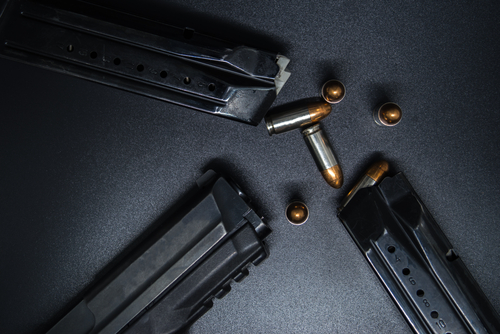States can't ban guns in banks, hospitals and churches, but property owners can, 9th Circuit says

A federal appeals court on Friday refused to allow two states to ban guns in some locations but limited the impact of its decision when it ruled that property owners can reject firearms. (Image from Shutterstock)
A federal appeals court on Friday refused to allow two states to ban guns in some locations but limited the impact of its decision when it ruled that property owners can reject firearms.
Citing a “basic background principle of property law,” the 9th U.S. Circuit Court of Appeals at San Francisco said states can’t ban guns at locations that include hospitals, banks and churches, but property owners can.
“Nothing in the text of the Second Amendment or otherwise suggests that a private property owner—even owners who open their private property to the public—must allow persons who bear arms to enter,” the appeals court said in a Sept. 6 opinion.
The 9th Circuit panel made carrying guns onto private property even more difficult in Hawaii when it reinstated the state’s default rule that automatically bans guns on private property unless the owner affirmatively gives consent.
But the 9th Circuit said a default rule in California went too far by requiring gun-consenting property owners to show consent just one way: by posting a sign of a particular size.
“We find no historical support for that stringent limitation,” the appeals court said.
The 9th Circuit said the 2nd Circuit at New York and some district courts have issued contrary rulings on its “primary holding—that a national tradition likely exists of prohibiting the carrying of firearms on private property without the owner’s oral or written consent.”
The appeals court weighed bans on guns in a variety of locations using a historical analysis outlined in U.S. Supreme Court decisions. More than half of the gun-ban locations likely passed constitutional muster—including bans on guns in bars, parks, stadiums and libraries—and they can be enforced, the appeals court said.
Hawaii and California differed in the locations in which guns were banned. The appeals court considered these 11 provisions adopted by one or both states and ruled:
Parks, athletic facilities and similar areas. Gun bans there are likely constitutional.
Playgrounds and youth centers. Gun bans there are likely constitutional.
Bars and restaurants that serve alcohol. Gun bans there are likely constitutional.
Places of amusement, including casinos, stadiums, amusement parks, zoos, museums and libraries. Gun bans there are likely constitutional.
Parking areas connected to certain sensitive places. Gun bans there are likely constitutional.
The private-property default rule. Hawaii’s rule banning guns on private property unless the owner gives consent orally, in writing or on a sign is likely constitutional.
Places of worship. State-mandated gun bans there are likely unconstitutional, but nothing prevents the owner or operator from banning firearms.
Gatherings that require a permit. Gun bans there are likely unconstitutional.
Financial institutions. State-mandated gun bans there are likely unconstitutional, but nothing prevents the owner or operator from banning firearms.
Hospitals and other medical facilities. State-mandated gun bans there are likely unconstitutional, but nothing prevents the owner or operator from banning firearms.
Public transit. A broad ban on carrying guns on public transit is likely unconstitutional, but a narrower law allowing the carrying of unloaded and secured firearms would likely be constitutional.
The lists of places in which states can or can’t ban guns may appear arbitrary, the 9th Circuit acknowledged in an opinion by Senior Judge Susan P. Graber, an appointee of former President Bill Clinton.
“A state likely may ban firearms in museums but not churches, in restaurants but not hospitals, in libraries but not banks,” the appeals court said. “The deep historical analysis required by the Supreme Court provides the missing link, but the lack of an apparent logical connection among the sensitive places is hard to explain in ordinary terms.”
The case is Wolford v. Lopez.
Publications covering the 9th Circuit’s decision include Reuters, the Metropolitan News-Enterprise, the New York Times, the Volokh Conspiracy and Courthouse News Service.



